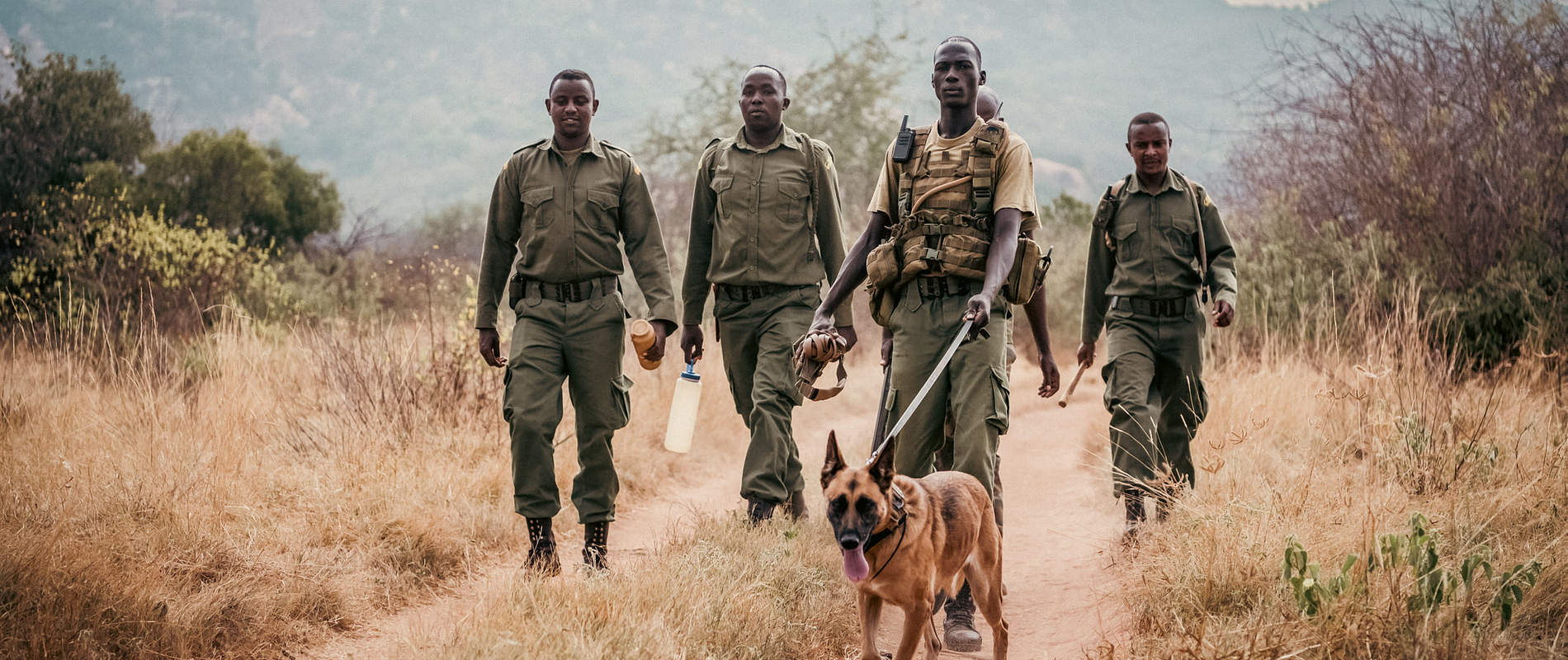Rangers are conservation heroes. They are multi-talented, hard-working, and brave, putting their lives on the line to protect our natural world. Over the years, our Anti-Poaching Teams have helped transform landscapes and tackle the greatest threats facing Kenya's wildlife.
For more than two decades, SWT rangers have been at the vanguard of conservation. What started as a single Tsavo-based Anti-Poaching Team in 1999 has grown into a comprehensive force protecting habitats across the country, working in partnership with the Kenya Wildlife Service. We now operate 23 fully mobile Anti-Poaching Teams, and fund two more teams operated by Mara Elephant Project (MEP) in the Mau Forest.
In honour of World Ranger Day, we are revisiting a favourite topic: What does it mean to be a ranger?

It means being a frontline defender of Kenya’s wildlife.
Being a ranger is a difficult, dangerous job. It entails long days, night operations, challenging conditions, and threatening encounters with both man and beast. Responding to intelligence and identifying telltale signs of illegal activity, they are the advance charge of field-level conservation.
Rangers are the best of boots on the ground: SWT/KWS Anti-Poaching Teams conduct most of their work on foot, while our Aerial Unit is on stand-by to support operations and deploy teams to remote destinations. Last year alone, they patrolled more than 65,000 kilometres on foot.

It means responding to all manner of field emergencies.
Working in the field is unpredictable by nature. With their local knowledge and specialised skill sets, rangers can rise to the challenge. They are often called upon to provide additional field support, tackling everything from veterinary treatments to orphan rescues to firefighting efforts. They approach these missions with the same dedication that they apply to tracking down poachers.
Anti-Poaching Teams are vital to the success of our Mobile Veterinary Units, tracking wild patients for hours until the veterinarian arrives and monitoring them afterwards in case follow-up treatment is needed. They are equally pivotal to rescue operations, keeping eyes on the young orphan until the transport team arrives. With human-wildlife conflict on the rise, rangers are the first port of call to push back animals who have wandered onto community lands. By mitigating these encounters, they save countless wild lives each year — and of equal importance, protect local communities and their livelihoods. They have developed a strong rapport with local communities, which has long-term conservation benefits.

It means catching wildlife offenders in their tracks.
Rangers work like a well-oiled machine to apprehend perpetrators. Ground teams move in to cut off escape routes and confiscate any weapons or paraphernalia left behind, while armed KWS rangers make the arrest. In 2022, our Anti-Poaching Teams supported the arrest of 989 perpetrators for a variety of offences.

It means removing threats from the field.
A combination of intensive training and innate ability, rangers have unparalleled bush prowess. Each new recruit undergoes a three-month intensive training course at the KWS Manyani Training Academy before being deployed to the field. Where most would only see vegetation, they are able to discern subtle disturbances in the ground, broken branches, and cleverly disguised snares.
Last year alone, SWT/KWS Anti-Poaching Teams confiscated 12,582 snares. To date, they have seized 3,172 weapons, destroying what could have otherwise claimed untold lives. Rangers also recover ivory from deceased or killed elephants. Tusks are securely stored by KWS, ensuring they don't fall into the wrong hands and enter the illegal ivory trade.

It means working alongside talented four-legged ‘rangers.’
In 2016, we launched our Canine Unit in partnership with the KWS. This specialised team has emerged as an incredible complement to our other anti-poaching efforts. Their mere presence is a deterrent; would-be poachers know that nothing gets past the dogs. They can follow a perpetrator for more than 15 kilometres, through extremely rugged wilderness. (For reference, a typical police dog tracks for about 1 kilometre.) On several occasions, the Canine Unit has tracked down a perpetrator to their very front door!

It means protecting Kenya’s most vulnerable habitats.
22 SWT/KWS Anti-Poaching Teams patrol within the greater Tsavo Conservation Area, collectively securing Kenya’s largest national park and the surrounding wilderness. In 2014, we expanded our presence to Meru National Park, which provides sanctuary to a critically important population of black and white rhinos. Under the direction of Mara Elephant Project, we also fund two teams based in the Mau Forest, an important water catchment area in the Rift Valley. We also provide funding to empower KWS Rapid Response Units in Tsavo, Mount Kenya, and Mount Elgon, the western conservation area.

Our Anti-Poaching Teams are ever-evolving, adapting to meet the threats of today and get ahead of those on the horizon. Together with KWS, these teams played a pivotal role in subduing the ivory poaching crisis in their areas of operation. When drought swept across Kenya last year, rangers rose to the challenge magnificently, keeping illegal activities down while supporting near-daily field emergencies, from orphan rescues to veterinary treatments to human-wildlife conflict mitigation.
As new threats come to the forefront, our Anti-Poaching Teams employ that same proactive approach to tackle them head-on. Today and every day, we honour the brave, dedicated rangers who make our conservation work possible.
